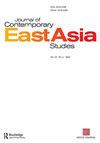Vietnam and China: ideological bedfellows, strange dreamers
IF 2.6
Q1 AREA STUDIES
引用次数: 7
Abstract
ABSTRACT The article examines the evolution of Vietnam–China relations in the post-Cold War to identify the factors that shapes its dynamics. It finds that the bilateral relations have been significantly changed overtime, from strategic antagonism to ideology-shared partnership and subsequently from economic sistership to security rivalry. The two countries’ worldviews have gradually diverged. Given geographical nearness is a constant, such a course is driven by the interactions of four factours, including shifts in security environment, internal factional politics, economic calculations, and rising nationalism. At different points of time, some factor rises dominantly and these others matter less. However, it is observed that since the normalization in 1991 shared ideology figured less and less significantly.越南和中国:意识形态同床异梦者
摘要本文考察了冷战后越南与中国关系的演变,以确定影响其动态的因素。研究发现,随着时间的推移,双边关系发生了重大变化,从战略对抗转变为意识形态共享伙伴关系,随后从经济姐妹关系转变为安全对抗。两国的世界观逐渐出现分歧。鉴于地理位置的接近是一个常数,这一过程是由四个因素的相互作用驱动的,包括安全环境的变化、内部派系政治、经济计算和日益高涨的民族主义。在不同的时间点,一些因素占主导地位,而其他因素则不那么重要。然而,有人观察到,自1991年正常化以来,共享意识形态的重要性越来越小。
本文章由计算机程序翻译,如有差异,请以英文原文为准。
求助全文
约1分钟内获得全文
求助全文
来源期刊

Journal of Contemporary East Asia Studies
Social Sciences-Cultural Studies
CiteScore
2.50
自引率
0.00%
发文量
10
审稿时长
6 weeks
 求助内容:
求助内容: 应助结果提醒方式:
应助结果提醒方式:


